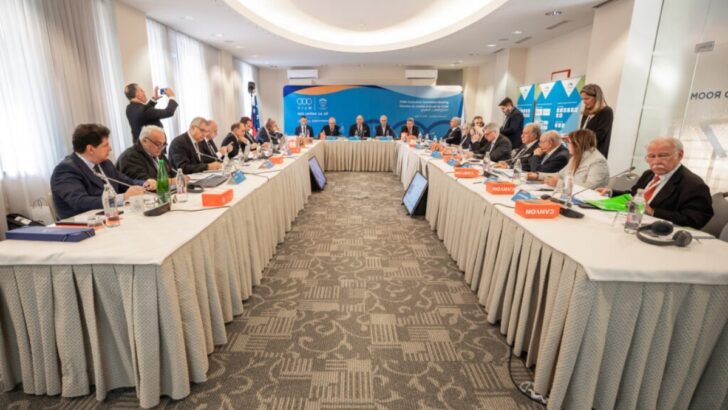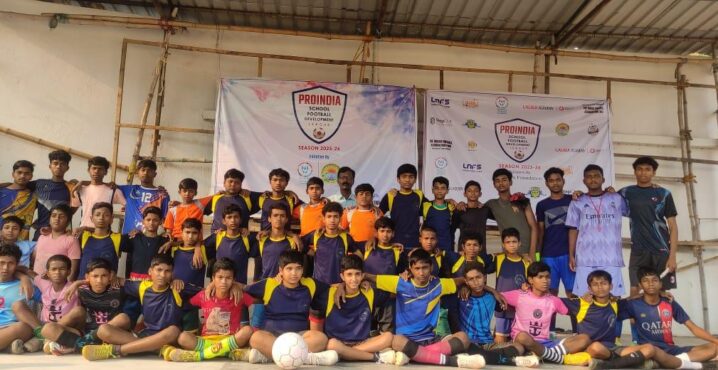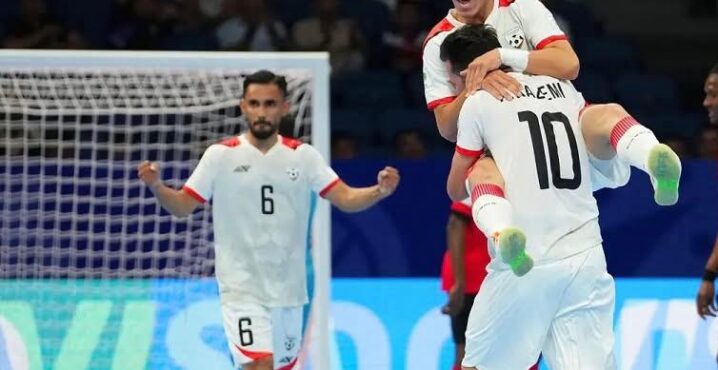Estimated reading time:13 minutes, 29 seconds
As Pristina 2030 prepares to debut futsal and Taranto 2026 lays the groundwork for sporting legacy, the Mediterranean Games embrace a fast-paced sport with the power to unite, inspire, and transform grassroots futsal across three continents.
The Mediterranean Games – a multi-sport event uniting nations from Europe, Africa, and Asia – is poised for a significant shift: the inclusion of futsal. For the first time in the Games’ history, futsal (indoor five-a-side football) will be part of the official sports programme at the 2030 edition in Pristina, Kosovo. Both men’s and women’s futsal tournaments are set to debut, replacing the traditional men’s under-21 football competition that has been a staple of the Games since 1991. This decision, confirmed by the International Committee of the Mediterranean Games (ICMG) after “productive discussions with FIFA,” is heralded as a milestone for the sport. It aligns with futsal’s fast-growing popularity and the ICMG’s commitment to greater gender inclusivity, while also reducing the costs associated with staging a full outdoor football tournament.
(Main image: Meeting in Ljubljana of the ICMG – Source: ICMG)
Importantly, the switch to futsal addresses a longstanding gap in the Mediterranean Games’ program. Until now, the Games featured only a men’s football tournament and no women’s football event – in the upcoming 2026 Games in Taranto (Italy), for example, a men’s U21 football competition is planned across four different stadiums, with no equivalent women’s matches. Come Pristina 2030, futsal will not only fill this void but also create a new platform for female athletes. By introducing women’s futsal alongside men’s, the Games move toward parity in one of the region’s favorite sports. “This decision supports the continued growth of futsal – a fast-paced sport that is growing in popularity – and aligns with the ICMG’s commitment to strengthening gender inclusion in the Games,” the ICMG noted in its announcement. In short, futsal’s inclusion is more than a swap of football codes – it’s a statement about the Games’ evolution with the times.
Taranto 2026: Laying the Groundwork
Even before futsal’s official debut, the upcoming Taranto 2026 Mediterranean Games are setting the stage for innovation and development in regional sport. Preparations in Taranto, a coastal city in Italy’s Puglia region, are in full swing to ensure the event’s success. Upgrading sports infrastructure has been “vital for both the event and the community”, according to local organizers. The Italian government has thrown significant support behind Taranto 2026, securing a record €350 million (the highest sum ever allocated to a sporting event in southern Italy) to build and modernise facilities. This includes the renovation of the Stadio Erasmo Iacovone – Taranto’s main football stadium – and the development of other venues. Such investment is aimed not only at a memorable Games but also at a lasting legacy for local sports.
One high-profile project is the construction of a new nautical centre to host sailing and rowing events, slated for completion by early 2026. While this venue is for water sports, Taranto is also improving indoor arenas and multipurpose halls for disciplines like basketball, volleyball, and handball – facilities that could easily double as futsal courts in the future. Italy’s National Olympic Committee (CONI) has been closely involved in these efforts, underscoring the national importance of Taranto 2026. Organizers emphasize that world-class venues will benefit the community long after the closing ceremony. For instance, the Athletes’ Village is planned to be converted into housing units post-Games, and new sports halls will be available for schools and clubs in the region. “The construction of the Games’ facilities is progressing and will become even more visible in the coming months,” noted Italy’s Sports Minister Andrea Abodi, who announced an additional €25 million in funding on top of the initial budget. This bodes well for sports like futsal – local clubs and youth academies in Taranto can expect improved arenas where they can train and compete once the Games conclude, illustrating how hosting a multi-sport event can directly bolster sports infrastructure at the grassroots.
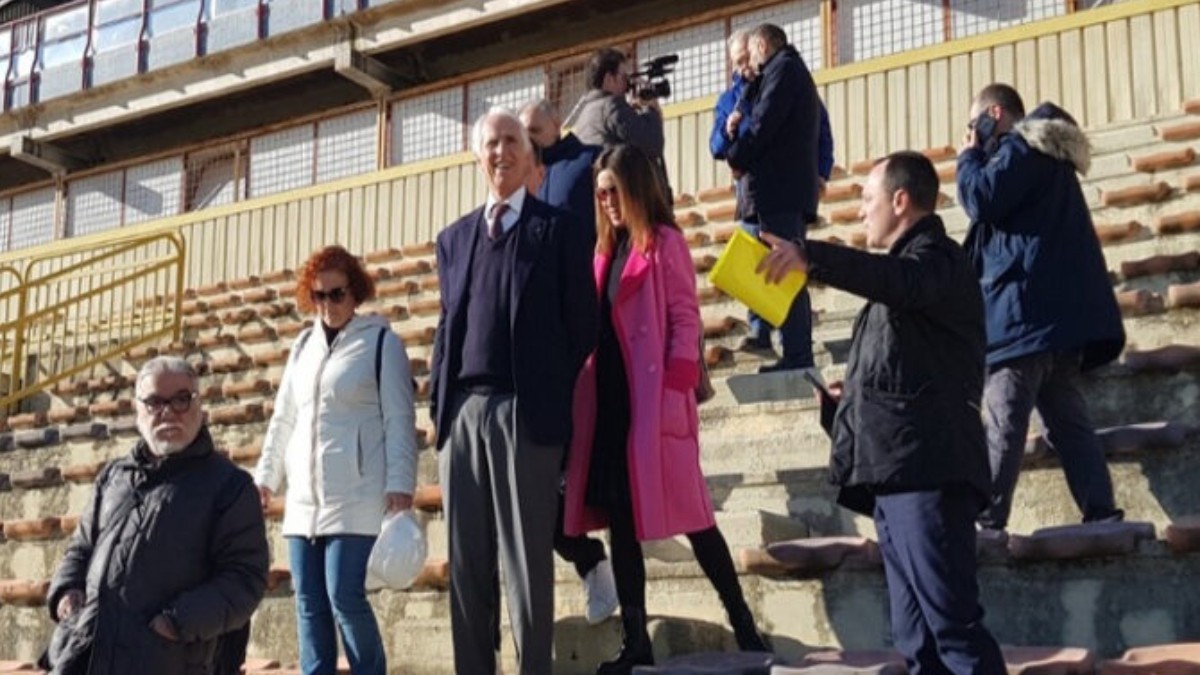
CONI President Giovanni Malagò (C). CIJM
Taranto 2026 is also breaking new ground in the sports program itself. Notably, it will introduce padel – another fast-growing sport – as a medal event for the first time. The willingness to add modern, youth-oriented sports like padel (and soon futsal) reflects a broader strategy: the Mediterranean Games are evolving to stay relevant and exciting. This mix of tradition and innovation is supported at the highest levels. Iakovos Filippousis, ICMG Secretary General, praised “the active involvement of the Italian government” in Taranto’s preparations and expressed confidence that Taranto “will be ready… to offer our athletes an unforgettable experience”. That optimism, coupled with concrete investment, indicates that Taranto 2026 will not only be a bridge to futsal’s future inclusion but also a showcase of how enhancing sports infrastructure can leave a legacy for community sports development.
Sports Diplomacy and Regional Unity
Futsal’s elevation to the Mediterranean Games carries significance beyond the court. It fits into a larger narrative of sports diplomacy and regional cooperation that the Games have embodied since their inception in 1951. Bringing futsal into the fold strengthens these ideals in multiple ways. Firstly, football in any form is a common language across the Mediterranean. Virtually every country in the region has a love for the beautiful game – whether on grass or on hardwood – making futsal a powerful tool for connection. The inclusion of futsal means more nations can participate competitively; some smaller or less traditionally football-dominant countries might shine in futsal thanks to its accessibility and the different skills it highlights. This could lead to unexpected moments of unity and pride. For example, North African nations have become futsal powerhouses in recent years – Morocco’s national futsal team reached the quarter-finals of the FIFA Futsal World Cup, marking the best-ever performance by an African team. Their presence (along with that of Algeria, Egypt, Tunisia, and others) in a Mediterranean futsal tournament will heighten the level of competition and camaraderie between African and European shores of the Mediterranean.
The very act of Kosovo being awarded the 2030 Games in Pristina – and leading the charge on futsal – is itself a testament to sports diplomacy. Kosovo’s membership and participation in such events help integrate it into the regional community, despite political complexities. As Kosovo’s Olympic Committee proudly announced futsal’s inclusion, they noted that “in Kosovo, futsal is followed with great interest” and the country boasts well-organized teams and talented players. For a young nation, hosting the Games (and a sport it excels in) is a chance to build bridges with neighbours through friendly competition. The Mediterranean Games motto, “Sea unites us all,” rings especially true as new sports like futsal create additional touchpoints for cultural exchange.
Leaders in the region recognize the Games’ role in fostering unity. “The 2026 Games will undoubtedly be a beautiful chapter not only in sports but also in cultural exchange,” affirmed Tommaso Foti, Italy’s Minister for European Affairs, at a recent Taranto 2026 seminar. He emphasized that such events are “not only about competition but also about genuine and profound friendship among people.” Futsal, with its inherently collaborative and fair-play spirit, fits well into this vision. Mixed with the passionate Mediterranean sporting culture, the futsal courts in 2030 could become arenas of diplomacy – where after hard-fought matches, players from different shores shake hands, exchange jerseys, and forge friendships. The sport’s inclusion also invites cross-regional cooperation in its organization. FIFA’s guidance in integrating futsal shows global and local bodies working together, and national federations will coordinate to send their futsal teams, often involving both football and futsal departments. Such collaboration sets an example of unity of purpose across bureaucratic and national lines. In essence, futsal at the Mediterranean Games is more than a new medal event; it’s a new medium for the Games’ founding principle of regional solidarity.
Engaging Youth and Growing the Grassroots
Another driving force behind futsal’s rise on the Mediterranean stage is its appeal to youth and grassroots development. Futsal is fast, fun, and relatable – it’s played on small courts, in school gymnasiums, on the streets, and in community centers across the region. By elevating futsal to a prestigious multi-sport event, the ICMG is effectively shining a spotlight on a sport that many young people already enjoy informally. This move can inspire the next generation and funnel youthful enthusiasm into organized sport. Observers note that many of the world’s greatest football stars – from Pelé and Cristiano Ronaldo to Lionel Messi – grew up honing their skills with futsal or similar small-sided games. The Mediterranean countries are no exception: in Spain, Italy, Portugal, and across the Balkans, countless children play futsal as an introduction to football, developing quick reflexes and close ball control in tight spaces. Now, those kids can dream not only of the World Cup or Champions League, but also of representing their country in futsal at a major international games. And, if they prefer futsal, UEFA and the associations across Europe continue to elevate the sport with increased investment and competition opportunities from the amateur level to the professional and international stage.
The benefits of futsal for youth development are well documented by coaches. The game’s smaller team sizes and faster pace mean each player gets more touches on the ball and must make split-second decisions. This environment accelerates skill learning and creativity. “Futsal compresses soccer’s essential skills into a small box… making and correcting errors, and learning fast,” notes one youth training expert. As futsal gains prominence, football federations in Mediterranean nations have been ramping up grassroots programs – from establishing youth futsal leagues to integrating futsal training in soccer academies – to capitalize on its developmental advantages. For instance, the French Football Federation and Italian Football Federation have both launched initiatives to grow futsal at the school and club level, recognizing it as a tool to boost overall skill proficiency. Now, with the Mediterranean Games offering a futsal medal, these efforts may intensify. Countries will want a strong showing in 2030, which means identifying and training young talent in the years prior. We may see more youth futsal tournaments in the region, funded by federations keen to build competitive national squads. In turn, this creates more opportunities for young athletes – boys and girls – to engage in the sport. Notably, some Mediterranean nations where women’s full-size football faces challenges have found success in women’s futsal. The inclusion of a women’s futsal competition at Pristina 2030 could motivate federations to start or expand women’s futsal leagues at the grassroots, giving more girls a chance to play. It’s a virtuous cycle: high-profile events inspire youth participation, and broad youth participation strengthens the sport’s foundation.
Grassroots clubs stand to benefit as well. When a sport gains prestige, it often gains resources. Local futsal clubs in Mediterranean countries could see a surge in interest from sponsors, local authorities, and new players thanks to this higher profile. Hosting futsal in 2030 will likely require building or upgrading indoor arenas in Pristina; those facilities can later serve community needs, from local league matches to school sports days. A similar dynamic will follow in any future host cities. In Taranto, even though futsal isn’t on the 2026 roster, the Games’ infrastructure boom includes multi-sport halls that local futsal leagues can utilize. For example, a new indoor sports complex in a Taranto suburb built for the Games could later host regional futsal championships. Such infrastructure legacy means kids who start playing futsal on a tiny court today might, a few years down the line, find themselves training in a modern arena that came out of the Mediterranean Games investment. It’s a scenario where top-down and bottom-up development meet: the prestige of a medal event trickles down to better facilities and funding, while grassroots energy bubbles up to produce future champions.
Building Bridges Through Sport
At its heart, the story of futsal’s journey into the Mediterranean Games is about adaptation and opportunity. It showcases how a venerable sporting event can adapt to contemporary trends – embracing a sport born on the streets of Montevideo and the courts of Barcelona – and in doing so, create new opportunities for athletes and fans alike. This journey is happening at an opportune time. Globally, futsal is on the upswing: FIFA has confirmed the launch of the first-ever FIFA Women’s Futsal World Cup in late 2025, a development that dovetails perfectly with the Mediterranean Games’ plan to include women’s futsal in 2030. The sport’s profile is rising just as the Mediterranean Games are providing it a grand platform. We’ve seen a preview of how successful this marriage can be. When futsal replaced football at the 2018 Youth Olympic Games, it “proved a huge hit among the Buenos Aires public”, wowing crowds with “scintillating skills and high-octane intensity.” In other words, futsal has already passed the test of winning over multi-sport audiences on the world stage. Now it’s the Mediterranean’s turn to experience that excitement.
Looking ahead to Taranto 2026 and Pristina 2030, one can envision the scene: In Taranto’s ancient streets and along its harbour, banners welcome athletes from across the Mediterranean. The city’s refurbished stadiums and new sports halls buzz with competition. While Taranto’s fans will cheer their U21 calcio (football) squad in 2026, they’ll also be aware that a new chapter is on the horizon. Four years later in Pristina, the roar of the crowd will echo inside indoor arenas as futsal players dart across the court representing twenty-plus nations. The atmosphere will be electric – a Mediterranean Futsal Cup of sorts finally under the official Games umbrella, decades after smaller invitational tournaments hinted at the concept. But this time, the stakes are higher and the message louder. Each goal scored in Pristina 2030 will symbolize more than a point on the board; it will symbolize the unifying power of sport and the progress of futsal from local grassroots pastime to a marquee event.
In conclusion, futsal’s inclusion in the Mediterranean Games is a win-win on multiple levels. It enriches the Games with a dynamic sport that resonates with youth. It amplifies themes of gender equality by expanding women’s participation. It offers practical advantages – cost savings and compact infrastructure – for host cities striving to deliver successful events. And perhaps most profoundly, it strengthens the Mediterranean Games’ core mission of fostering friendship and cooperation among diverse nations. “Sport is not only about competition but also about friendship among people,” as minister Foti reminded us – futsal will embody that spirit on a fast-moving, 40×20 meter court. From the grassroots clubs tucked in the alleys of Mediterranean towns to the bright lights of the Games, futsal’s journey is a compelling example of how sports evolve and bring people together. When the first futsal ball kicks off at the Taranto Games’ opening ceremony (perhaps in a demonstration, hinting at what’s to come) or at Pristina’s medal matches, it will mark the culmination of years of vision and collaboration. A small-court game born in humble settings will have officially arrived on one of the region’s biggest stages – and its ripple effects on diplomacy, youth engagement, and regional sport development will be felt for years to come. In the Mediterranean, futsal’s time to shine has truly begun.
Organ Donation
Futsal Focus is a supporter of Dáithí Mac Gabhann and his family’s campaign to raise awareness of Organ Donation. We encourage our readers to learn more about Organ Donation: https://www.organdonation.nhs.uk/
Futsal Focus
You can read more articles about International Futsal by going to the top navigation bar or by clicking here
If you like this article and would like to keep updated on Futsal news, developments, etc. You can now follow Futsal Focus via Google News. By following our page which will send you an alert as soon as we publish an article. Please click here and follow us on Google.
You can also keep updated on Futsal news, developments by submitting your email below in the Subscribe to Futsal Focus option.
Follow Futsal Focus by clicking on Facebook, Twitter, or Instagram or on the social media buttons on the website



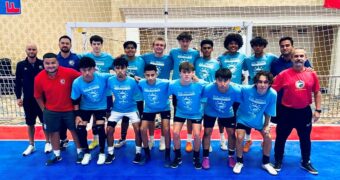
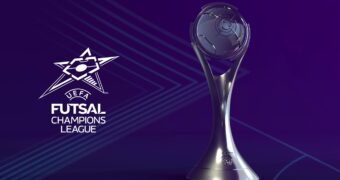

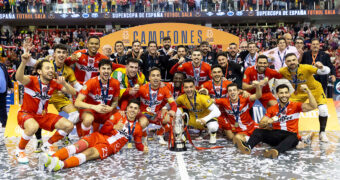
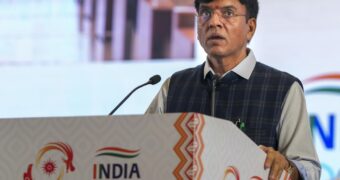
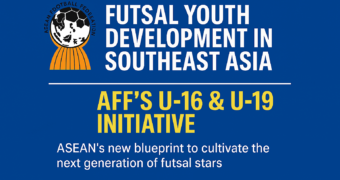



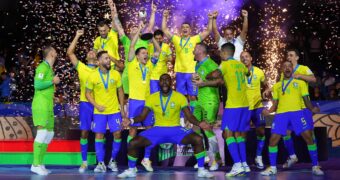



![Validate my RSS feed [Valid RSS]](https://www.futsalfocus.net/wp-content/uploads/2020/01/valid-rss-rogers.png)

